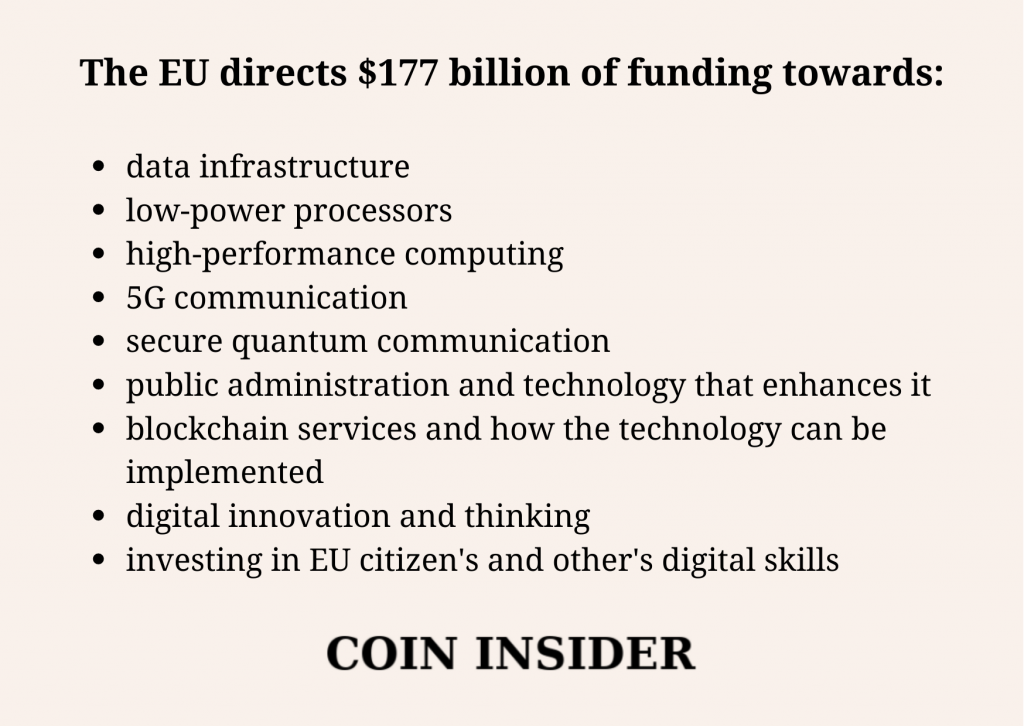Italy’s State-Owned Bank Trials Digital Bonds on Polygon Blockchain
The European Central Bank initiated the trial to explore how blockchains can enhance central bank settlement.

The European Union has been reported to be looking to increase tech development in the continent with a multibillion-dollar investment. The Union is planning to fund investment in the technological industries, including blockchain and data infrastructure.
As per a Bloomberg report, the funds are coming from the EU’s €750 billion ($887 billion) pandemic recovery fund. About 20% of this ($177 billion) will be used to research and develop technology and its implementation. Projects will be organised across several countries in the EU with a specific push towards those with regional manufacturing semiconductors. Following the pandemic, there has been a global shortage that has slowed carmakers to slow down their production lines. Part of the EU’s investment will be to increase production time and find a resolution.
According to EU Commission President Ursula von der Leyen, this will be a digital “make-or-break issue” for the region.
EU officials will be directing funding towards the development in the following areas by 2030:
No information has been given on where and how the funding will be invested in each sector.
In September, the IOTA Foundation announced that it had been selected as one of seven organisations to support the initial development and early-stage testing of the European Blockchain Service Infrastructure (EBSI). As an EU-wide blockchain project, the initiative aims to “design new DLT solutions to improve the scalability, energy efficiency and security of EBSI, a network of blockchain nodes across Europe.”
As a blockchain solution, IOTA offers massive potential to support the EU project to establish and maintain international and governmental relations through blockchain. With open-sourced and transparent communication, the initiative could spark a technological revolution in the way relations can be conducted across the EU.
Further, in 2019, the region initiated a project to support and increase the adoption of distributed ledger technology in the EU. The aim of the International Association of Trusted Blockchain Applications is towards “supporting interoperability, developing specifications, promoting standards and regulatory convergence to support the development and exploitation of innovative blockchain technologies.”
As a result of projects and platforms to pilot and launch blockchain projects, the EU is spearheading piloting how the innovative technology can be implemented as a scalable solution to several issues in the region. If the technology continues to see increased testing, development and establish itself as part of governing relations and solutions, we will start seeing stronger regulation and framework surrounding the technology. If this is the case, we will very likely see how quickly the technology can be adopted for active use in the financial realm in the region and across the globe.
While Bitcoin might not be the elected solution – despite the adoption emerging in countries like El Salvadore fully accepting the token as legal tender and Ukraine leaning in the same direction – cryptocurrency regulation is on the rise.
According to a recent survey conducted by Redfield & Wilton Strategies for Euronews, many EU citizens would elect for national regulation, rather than European Union intervention. The results were taken from respondents across the region from Estonia, France, Germany, Greece, Hungary, Italy, Latvia, Lithuania, the Netherlands, Poland, Portugal and Spain.
According to the respondents, a whopping 61% in Greece, 34% in Germany, and 31% in Latvia believe that the EU and ECB played too big a role in the country’s economy. In all of the countries surveyed, 100% responded that they would prefer national over regional regulation in terms of cryptocurrency and blockchain adoption.
The survey found that there was a mixed result across the continent regarding whether citizens would prefer cryptocurrency or a digital currency in the country or not.
Those in Italy with 41%, Greece with 40%, Estonia with 39% and Spain with 37 per cent% were the highest to support cryptocurrency initiatives. On the other side of the coin, the Netherlands brought the only results where there was more opposition than the support of a digital currency with 37% not in favour.
The European Central Bank initiated the trial to explore how blockchains can enhance central bank settlement.
n recent months, inflation measures, including the Consumer Price Index and Personal Consumption Expenditures Index, have moderated.
BlockFi clients are to note that client communications will exclusively occur through official email channels.
CryptoQuant CEO says Bitcoin is still vulnerable to “speculative FUDs,” giving smart money a way to buy up cheap BTC.